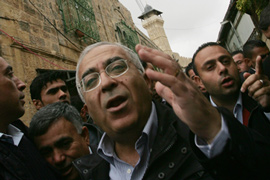Concerns over Israel heritage list
Unesco and EU decry Israel’s bid to add sites in the West Bank to its list of national heritage.

The European Union (EU) also voiced concern over the decision, saying the move would not help the peace process.
Catherine Ashton, the EU’s foreign-policy director, “regards the recent decision…as
detrimental to attempts to relaunch peace negotiations,” her spokesman, Lutz Guellner, said in a statement.
The EU “calls on Israel to refrain from provocative acts …recognie the importance of these religious sites to all three Abrahamic faiths and support the principle of access for all,” the statement said.
‘Holy land-grab’
Bashar Jaafari, Syria’s ambassador to the UN, speaking on behalf of the Organisation of the Islamic Conference (OIC), also condemned the “illegality and illegitimacy” of the Israeli decision.
Mark Toner, a US state department spokesman, called Israel’s heritage site list on Friday a “provocation” and an obstacle to peace.
|
“The process of swallowing the Ibrahimi Mosque started with a request to put a candle holder inside it.” Osama Hamdan, Hamas’ representative in Lebanon Read the full interview |
Palestinians are calling the move an attempt to seize land and holy sites on illegally-occupied land.
Osama Hamdan, Hamas’ representative in Lebanon, told Al Jazeera: “When it comes to religion, Israel has a plan in changing the nature of Islamic sites and turn them into Jewish sites in a way that serves what they call the Judaisation of the state (of Israel).
“The process of swallowing the Ibrahimi Mosque started with a request to put a candle holder inside it.
“After the massacre that took place in the mosque in 1994 by the Jewish terrorist Baruch Goldstein, they divided the mosque between them and the Palestinians. Today, they are confiscating the whole mosque. So we can see there is a pattern.”
The Cave of the Patriarchs is sacred to Jews and Muslims as the traditional burial place of important religious figures.
Hebron and the shrine itself have long been flashpoints of violence in the West Bank – territory Israel’s government calls by its biblical names Judea and Samaria.
Violence
Protests in Hebron on Thursday turned violent following Netanyahu’s announcement about the heritage programme.
 |
| Fayyad attended prayers at the Ibrahimi Mosque to express Palestinian solidarity [AFP] |
Clashes continued on Friday, with Israeli forces dispersing crowds with tear gas.
Salam Fayyad, the Palestinian prime minister, attended prayers at the tomb of Abraham on Friday, in a symbolic move to assert a Palestinian presence there after days of violence.
Speaking to reporters after prayers, Fayyad accused Israel of “annexing” it.
Israel has said that it had added the sites to a list of Jewish shrines due for restoration. It promised that Muslims would still be free to worship there.
Shimon Peres, the Israeli president, said on Friday: “There are many places that are holy to all of us so we are not monopolising.
“And in the Cave of the Monarchs, a holy site for Jews and Muslims as they call it, we even made arrangements that everybody will pray.”